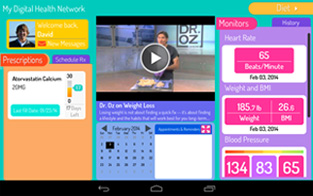Introducing MyDigitalHealth Network (MDHN)
By David Dubbs, CEO / Founder on
 Here at MyDigitialHealth Network (MDHN), we’ve been busy with the launch of our new platform for Heart Failure (CHF) with a nationally renown cardiology team in the U.S.
Here at MyDigitialHealth Network (MDHN), we’ve been busy with the launch of our new platform for Heart Failure (CHF) with a nationally renown cardiology team in the U.S.
It’s an exciting day for us, and we are looking forward to connecting with you.
Who We Are And What We Do
The idea for MDHN stemmed from my frustration over the persistence of heart disease as the #1 killer in America and the inability for people to manage their chronic disease.
Why should your odds of survival be tied to the care you receive in the hospital?
Why can’t I effectively manage my disease at home and not only improve my quality of life, but avoid hospital readmissions in the process?
I began a personal odyssey for 2 years to understand the dynamics of patients, providers, and payers and the home-based solutions that are available. While a lot of companies and hospitals are creating their own apps and mHealth products, it was clear that nobody had really cracked the code.
How were seniors with CHF supposed to locate an app that’s right for them? There are more than 100,000 healthcare apps in the App Store. Even if they could find an app, they would need to know how to download it; register it; configure it; pair it with wireless monitors; upload their personal health information (PHI) and somehow store & forward the data to a medical professional.
If there’s anything that I’ve learned from 30+ years studying consumer behavior, it’s that every additional requirement you make a person do, is one more thing they won’t do.
So, it seemed clear there was a need for a well-designed, simple, comprehensive solution that’s easy to use.
A Problem That Needs a Solution
The statistics on Heart Failure are overwhelming:
- 5.1 million people in the United States have CHF1
- Heart failure costs the nation an estimated $32 billion each year²
- The readmission rate after discharge is alarming — 25% are readmitted within 30 days and 33% within 90 days.³
I began having conversations with cardiologists, Nurse Practitioners, CHF patients and healthcare executives to research how we could deliver an integrated solution.
Here’s what we (and our clinical partners) believe: if a CHF patient does just 3 things – track their weight, heart rate and blood pressure–while taking their medications as directed, we can bend the curve on avoidable hospital readmissions.
MyDigitalHealth Network was specifically designed to address not only these key factors, but to provide a turnkey solution to help Heart Failure patients stay at home, and avoid readmission to the hospital.
1Heart disease and stroke statistics—2013 update: a report from the American Heart Association
²Forecasting the future of cardiovascular disease in the United States: a policy statement from the American Heart Association . Circulation. 2011
³Diagnoses and Timing of 30-Day Readmissions After Hospitalization for Heart Failure, Acute Myocardial Infarction, or Pneumonia – JAMA January 23/30, 2013, Vol 309, No. 4
Leave a Comment